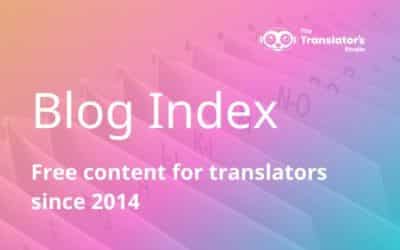Feeling confused by your translation quote? This post will help you understand it. Read on to make sure you choose the best translator for the job.
This article includes:
– Quick guide to translation pricing
– 6 reasons why translation suppliers quote different prices
– 10 things you do that affect the price of your translation
– What information to give when you ask for a translation quote
Quick guide to translation pricing
Translators and translation agencies use different systems to produce their quotes. You might get a total price for the project, or you may get a price per word, line, page or hour. To identify who is offering the best deal, it’s easiest to focus on the end price. Why?
Professional freelance translators base their translation quote on how long they think the job will take
Your translation might be going to take an hour, a day, a week or a month. Professional translators have set prices for each of those scenarios. There are lots of things that affect these prices, as I’ll explain below. But, if a customer asks for a per-page or per-word price, all we do is divide our time-based price accordingly. This means the end price for the job will always be the same. So, it doesn’t matter how we present it on our quotes.
Translation agencies will probably use a percentage system
Translation agencies have more complex cost structures. They will probably have a set percentage they want to make on each job. They may take a cut from the full price and give the rest to the translator. Or, they may add a percentage on to what the translator charges them. Their cut will always be the same percentage. So, once again, it doesn’t matter how they present their end price.
Freelance translators who outsource translations probably don’t charge like agencies
If you ask a freelance translator to outsource a translation to colleagues, they will likely charge you for their time as project managers. This may work out as a better deal for you than working with a translation agency because there is no set commission. The end price on the quote will be what their colleague charges, plus their project management fee.
If your text has repeated sections and your translator uses translation software, they will be able to find them automatically.
Now you know why the end price is what matters. But, why doesn’t everyone charge the same end price?
6 reasons why translation suppliers quote different prices
Understanding the reasons why a translator quotes a certain price can help you ask the right questions. That way, it’ll be easy to identify which supplier represents the best investment for you.
1. Translation supplier’s costs.
Translation agencies have to pay employees, office rent and other costs. These costs are included in the price of your translation. Freelance translators are self-employed and normally work from home. This means they have lower costs, so they can charge less than an agency.
2. Translation supply chain
Translation agencies have to pay the translator. While, professional freelancers give agencies special prices, they have a minimum charge. If an agency offers you lower-than-average prices, they are probably using a cheap translator. The resulting translation may be so bad that it’s unusable.
If you work directly with a freelance translator then there is no supply chain. This means you will be able to see who you’re working with and research them online. If the price on their translation quote is lower than average, expect them to be amateurs. If it’s average, make sure they are true professionals. If it’s above average, ask them what extra value they’re offering.
3. Translator’s location
Most activity in the translation business takes place online, which means you can work with translators from all over the world. Location will be a factor in how much they charge for their services. For instance, translators in Spain may be cheaper than translators in England, simply because of cost of living.
4. Translator’s experience.
Experienced translators are much faster, more accurate and produce better style than amateur translators. We create more value for you because you get a translation that helps you make money. We save you time, give professional advice and help protect your international reputation. That is why we charge a professional fee.
5. Translator’s perception of quality
Your translation quote may not clearly show the level of quality you’re getting. It’s worth asking questions, to make sure the end result will meet your expectations.
The translation supplier’s quality process is the first thing to look at. Good agencies should include basic quality checks as standard. Good freelance translators should have their own quality processes in place. At the other end of the spectrum, bad suppliers may skip stages and not perform checks.
It’s important to make sure the supplier understands the quality level you need, so they can quote accurately. There is a big price difference between a publishable translation, with full quality checks, and an internal document, with limited checking. The second option takes less time and will cost you less.
6. Software the translator uses
Your translation supplier probably uses translation software to help them translate faster and produce higher quality. This software lets them take advantage of repeated phrases in your text. Depending on your content, they may also be able to use machine translation.
Translation suppliers have very different approaches to translation software. Some invest in the latest programs, while others don’t use it at all. You may see discounts on your translation quote related to this. That is positive. It means your translation supplier is using their software to make the translation cheaper for you.
But it isn’t all about the translator. What you do will also affect the price on your translation quote.
11 things you do that affect the price of your translation
1. Specialist terminology
If your text has specialist terminology, then your translation will take longer. This is because the translator will have to spend more time researching terms. Specialist texts are therefore more expensive. If you get a cheap quote for a specialist text, it means the translator isn’t going to check the terms properly. So the translation will contain mistakes.
If a customer asks for a per-page or per-word price, all we do is divide our time-based price accordingly.
2. Specialist readership
If someone would need special knowledge to fully understand your text, then you need a translator who specialises in your subject. This will definitely cost more, but the result will be an accurate translation that makes sense. Consider what knowledge a speaker of your language would need to fully understand your text. The translator should have the same knowledge.
3. Creativity needed to translate your text
When the translator has to be creative, it takes longer. Translating marketing texts, for instance, involves lots of reworks. It takes time to come up with just the right phrase. If you aren’t worried about style, tell the translator, because it will lower the price.
4. Long document + long deadline
If you have a long document (+20,000 words) with a long deadline, you may be able to get a discount. Long deadlines give freelance translators lots of flexibility and they love that. Agencies may also be able to ask the translator for a discount.
5. Short document + Short deadline
If the text is urgent, i.e., 24-hour turnaround or weekend work, expect a 25% surcharge on your translation quote. This is because the translator will need to work overtime to accommodate you.
5. Long document + Short deadline
This is a high-cost scenario and normally best handled by a translation agency. They will have to split the text between several translators. There won’t be a volume discount because the separate translators aren’t getting a high volume. And there may be an urgency fee. Read about quality risks from having different translators involved.
6. Number of individual texts and deliveries
A single text with one delivery is much faster for the translation supplier. It takes more time to organise lots of short texts with staggered deliveries. This time will be reflected on the translation quote.
7. Repetitions in your text
If your text has repeated sections and your translator uses translation software, they will be able to find them automatically. There will be a small charge for these sections, as they still represent time for the translator. But, if the translation quote takes repetitions into account, it will be much cheaper than one that doesn’t.
8. Last-minute changes
A translation quote is normally based on you supplying a final, complete text. If you don’t have the final text and want to make edits once translation has started, this will cost more. However, the translator can use translation software to make the job easier for them. This will reduce the extra cost, and you won’t need to highlight all the changes you make. Keep the price down by discussing this at the start.
9. Need for a proofreader
If you’re going to publish your text, it’s good idea to ask for an editor/proofreader to be included on the translation quote. The second professional will check accuracy, improve style and proofread the original translation. This always improves quality, but it will increase the price by about a third. You can limit this extra cost by asking the supplier to cap the number of hours allowed for this task.
10. Text format
Different formats take different times. Word format will be cheapest. PDF needs conversion and always takes longer. Scans are particularly time consuming, so they cost more. Avoid these costs by supplying the text in Word when you can.
What information to give when you ask for a translation quote
If you give a professional translator the following information, you’ll get a more accurate price, more quickly:
– The text. The translator has to see it to know exactly how long they need.
– Your quality requirements (e.g., public/internal). Because they affect how long the job will take.
– Your deadline.
– If you think there are repetitions in the text, say so. A professional translator can use translation software to reduce the price.
– Tell them if the text is part of a bigger project, so they can prepare for possible repetitions in future texts.
– Tell them if there are reference texts, images or style guides.
– Ask anything you want. A professional translator should be more than happy to answer your questions transparently.
Get our newsletter for translators!
Keep up to date with our blogs about translation and freelancing. Sign up for our newsletter in the sidebar.





0 Comments